Tuesday, December 18th 2012

Corsair Launches CX Series Modular Power Supplies
Corsair, a worldwide designer and supplier of high-performance components to the PC hardware market, today announced the addition of the CX Series Modular power supply units (PSUs) to the company's award-winning PSU line-up. Available in 430, 500, 600, and 750 watt power configurations, the new CX Modular PSUs provide PC builders with the stable reliability of Corsair PSUs at a price that is easy on the pocket.
Unlike budget PSUs, the CX Series Modular PSUs feature a hybrid modular cable system that allows PC builders to install just the cables (PCI-E, SATA, and 4-pin) required for their computer's configuration, for a cleaner look and improved airflow and cooling. The standard ATX form factor and ample cable lengths of the PSUs provide worry-free compatibility with the majority of PCs. In addition, the 80 PLUS Bronze certified PSUs deliver up to 85% energy efficiency at typical 50% usage loads, producing less heat, improving reliability, and reducing noise."Corsair CX Series PSUs have an unrivalled reputation for reliability, which has made them the clear choice for value-conscious PC builders," said Thi La, Senior VP and GM of Memory and Enthusiast Component Products at Corsair. "We designed the new CX Series Modular in response to customer requests for a modular PSU at lower price points. They are built to the same high level of quality as our Corsair CX Series, with new configurable cables that simplify installation and help PCs stay cool and uncluttered."
Pricing, Availability, and Warranty
The Corsair CX Series Modular PSUs are available immediately from Corsair's worldwide network of resellers and distributors. They are backed by a 3-year warranty and Corsair's well-earned reputation for quality, compatibility, and performance.
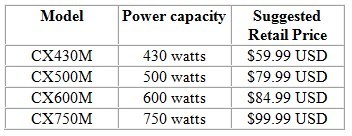
For more information on Corsair CX Series Modular PSUs, please visit the product page.
Unlike budget PSUs, the CX Series Modular PSUs feature a hybrid modular cable system that allows PC builders to install just the cables (PCI-E, SATA, and 4-pin) required for their computer's configuration, for a cleaner look and improved airflow and cooling. The standard ATX form factor and ample cable lengths of the PSUs provide worry-free compatibility with the majority of PCs. In addition, the 80 PLUS Bronze certified PSUs deliver up to 85% energy efficiency at typical 50% usage loads, producing less heat, improving reliability, and reducing noise."Corsair CX Series PSUs have an unrivalled reputation for reliability, which has made them the clear choice for value-conscious PC builders," said Thi La, Senior VP and GM of Memory and Enthusiast Component Products at Corsair. "We designed the new CX Series Modular in response to customer requests for a modular PSU at lower price points. They are built to the same high level of quality as our Corsair CX Series, with new configurable cables that simplify installation and help PCs stay cool and uncluttered."
Pricing, Availability, and Warranty
The Corsair CX Series Modular PSUs are available immediately from Corsair's worldwide network of resellers and distributors. They are backed by a 3-year warranty and Corsair's well-earned reputation for quality, compatibility, and performance.

For more information on Corsair CX Series Modular PSUs, please visit the product page.
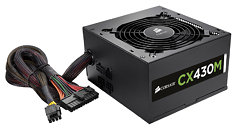
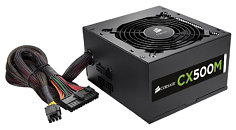
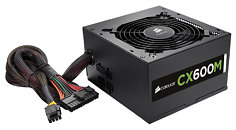
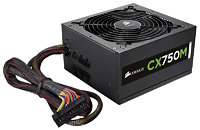
23 Comments on Corsair Launches CX Series Modular Power Supplies
Best,
LC
The 750 costs more than the TX750M though. So I really want to know how these perform before I can tell if it's good or bad.
But nice to see more low watt efficient PSU for builds like APU in a MicroATX Mini Tower... hard to hide the wires. Now all Corsair needs is to offer some nice economy based MicroATX Mini Tower.
I have SERIOUSLY considered cutting them on several occasions.
Good Move for the average PC guy , who doesn't need a 1000 watt generator for his build;)
Too bad though,,it look's like their Charging $30 or so, for the Modular option.
(atleast it's $30 with the CX600 purchase location verying of course)
CX430M: $52.99/shipped, OOS
CX500M: $66.99/shipped, OOS
CX600M: $76.99/shipped, OOS
CX750M: $95.99/shipped, OOS
All a few $ less than prices listed in first post.
It feels like the market is almost flooded with decent PSU's lately. Between €70 and €90 there are 40 different modular models out in sweden (using pricewatchers), ranging from 480W to 775W, and that's just the decent units. A lot to choose from.
It is definitely not the TX or AX series, but it appears to be working pretty well.
www.ocztechnologyforum.com/forum/showthread.php?11787-Power-whisper-load-or-temp
Now, it seems now that I've produced quite a novel here - sorry for that, but I find this topic v interesting and have been pursuing it for years.
As you may know (or may not, perhaps), any PSU's performance depends to a great degree on temperature - most importantly on its internal temperature, but also on the ambient. Simply speaking, the higher the temperature, the harder it is for a PSU to deliver not only its rated power, but also to do it while keeping tight voltage regulation. Now, not only are there hundreds of models of PC cases, but also crapzilions of configurations within said cases - both in terms of components, such as CPUs and VGAs, but also in terms of fans and cooling, and even more places where such rigs may work.
So, on one hand you might have a well cooled PC working in cool environment, say, Northern Europe, in a room with AC, and you may also have a loaded gaming PC in poorly designed and ventilated case (dual hi-endish VGAs and only a single 80cm exhaust fan - why not?) working in an attic room in Mexico. Now, you must understand that PSUs in these 2 PCs (we assume of course that the PSUs are identical) will be working in entirely, completely different thermal conditions. And because of that, they will perform differently. Simply speaking the one in Mexico will have to work its fan much harder to save itself from melting. To do that, it needs a temp controlled fan, namely a fan connected to a control system that is fed temp data. Load will not do - because even at low load, the PSU will be working under serious stress and most likely will provide sub-par voltage regulation. And imagine what happens if it's really pushed - and whatever rating it is, it has to work at 100% rated power. And in such a case it will most likely not deliver. Instead of, say, 500W from a 500W PSU you'll only get 400W. And you'll have every right to be pissed and to want it replaced with a good one.
Thermal constraints also apply to all certificates (80+, Gold, etc.) so designers have to make sure that their units actually pass tests. And tests are run at specified temperature, namely 23 C (77 F). Now, imagine what happens to a PSU whose fan only reacts to load? It flunks the test as it will not adjust the fan for higher RPM to help it achieve the desired efficiency or voltage regulation. As you may imagine 23 C / 77 F is unrealistically low, so trustworthy review sites (SPCR, Jonny, hardware secrets...) go for 40-50 C. To pass such tests the PSU really has to forget about load and trust the temp to ramp its fan up.
Now, as I understand, OCZEric (and e.g. OCZ's ad blurb for their ZT series) say "load controlled" but really mean "the load increases the temp inside the PSU and the temp sensor reads it".
Also, consider the added cost of a device to accurately measure the load - e.g. Kill-a-Watt sans LCD. This is a complicated, quite bulky device - it will not hide easily inside the PSU. Also, it's quite pricey and most likely would cause the price of any PSU go sky high. And would be easily found by any reviewer. Also, speaking of ZT - there are several reviews on the web and beyond doubt the PSU uses a quite ordinary Yate Loon fan, found in plenty other designs. It is neither a load nor thermal controlled fan - it's just a fan, it cannot decide by itself at what RPM to spin. Its managed by a controller, and in this case it is also a controller with a thermal sensor.
Lastly, what OCZEric wrote (back in 2005, yay), speaks poorly of him as an engineer.
Firstly, there are plenty PSUs out there (not only now, in 2005, too) that have very quick, aggressive controllers that speed the fan up too quickly even. On the other hand, there are plenty of PSUs that have gentle, smooth and smart controllers that keep the fan in check when there is no need to spin it up. The word is hysteresis - it lets you smooth out the curve at which sth changes. So a thermally controlled fan may or may not change its behavior right away.
Secondly, OCZERic says that thermally controlled fans behave erratically and constantly go up and down. Duh, but he just said thermally controlled fans are sluggish to react, right? He contradicts himself.
Also - it is actually load that goes up / down very quickly -when you go from idle (desktop) to, say, OCCT PSU Test, the 100W you may be pulling, will instantly, in a second, go up to, say 300W. Now that's a dramatic change. No way temperature of the entire unit, all capacitors, heatsinks and what have you inside, can go up from 36 C to 50 C in a second. It will take time, at least a minute or so.
So it means that actually the load controlled fan will be prone to quickly change its behavior.
Also, imagine that your rig is idling, but from time to time you start a new program, unzip sth, add more browser windows etc. - that means the load changes constantly, typically (for my rig) from 100W to 130W, 140W. That is only for a few seconds, maybe 2-3, maybe 5 - that's too short to make any significant change in temperature inside the PSU, but would be enough to trigger a change in the PSU fan's behavior, right?
One last thing - if you happen to be an owner of a ModXStream or ZT, do a simple test. Don't change the load, let the PC sit idle for a few minutes and observe the fan's behavior, with your case cooling and ambient temp at standard. Now, remove / switch off case cooling fans, and also grab a hairdryer and heat the PSU up. Its fan will spin up. If it doesn't, that means the PSU designer did a crappy job for not ensuring proper protection for the PSU. And trust me, no sane PSU maker will let that happen for fear of massive backlash from the PC community, not to speak of their own legal dept ;)
Again, I hope the size of the text did not scare you. Kudoz to anyone who chewed through it :)
Oh, one more thing - this is what OCZ site says (clik)
"Large-Diameter, Thermally Controlled Fan
Once you’ve installed a PSU, you shouldn’t have to think about it. Employing a thermally controlled fan makes the CX Series Modular quiet at idle, and the large diameter reduces noise even when you’re pushing your system hard."